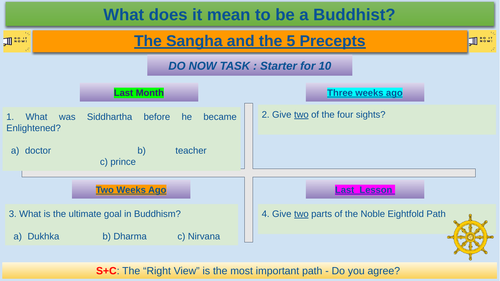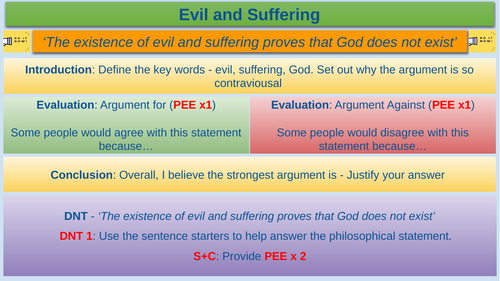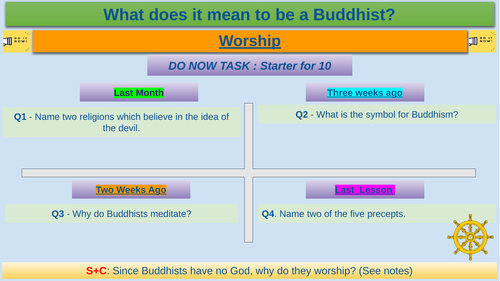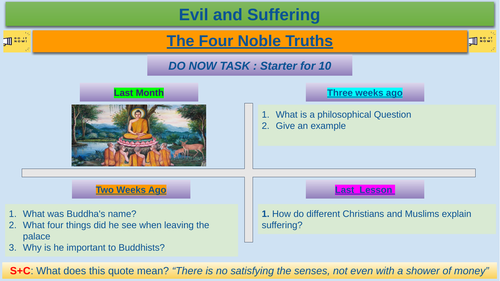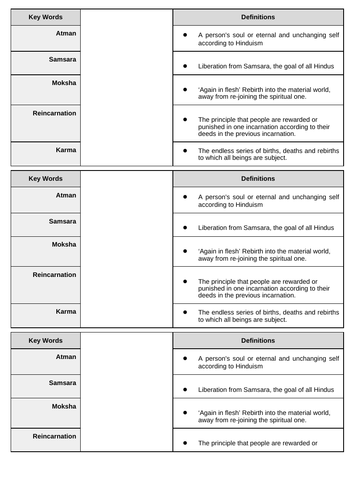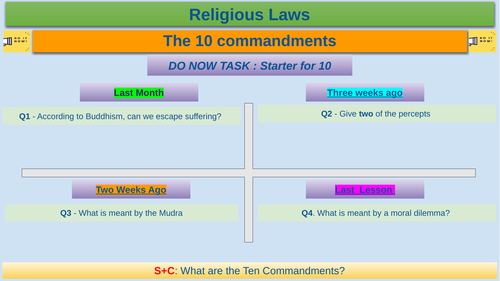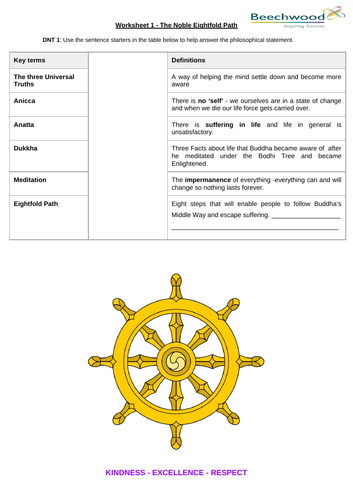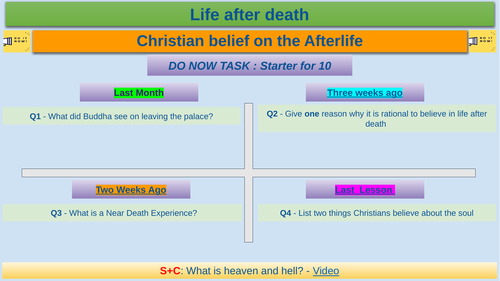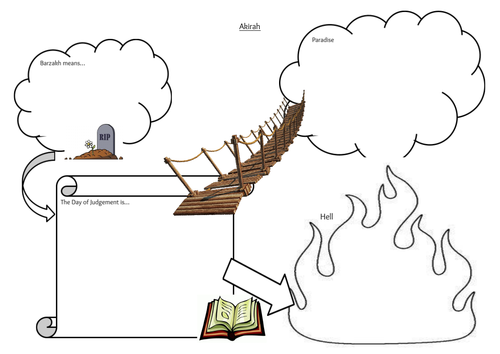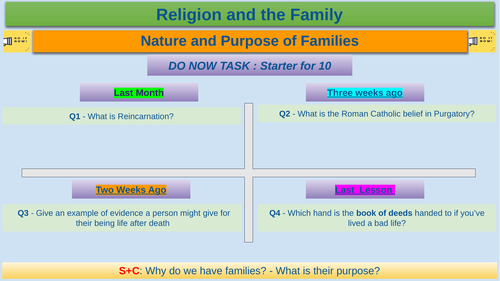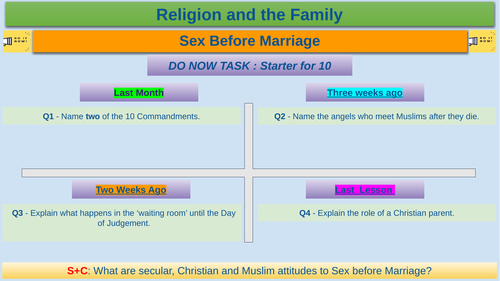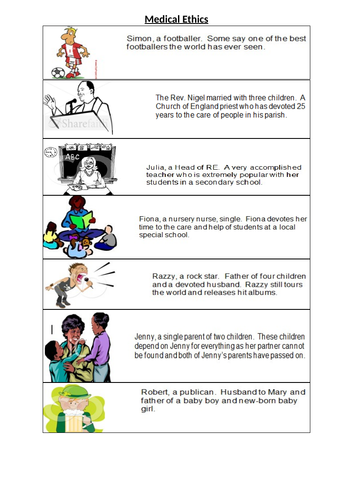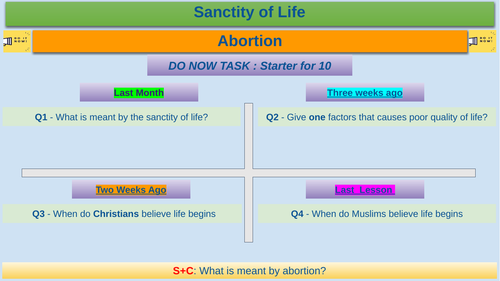
221Uploads
34k+Views
7k+Downloads
Religious education

The Sangha and the 5 Precepts
KS3 Philosophy and Ethics - Unit 1- Evil and Suffering
Students will be able to:
To identify the Five Precepts
To explain the day in a life of the Sangha
To evaluate the need for the Sangha to have additional moral codes
Feedback is welcome, please check out the rest of my lessons in the Science and Religion Scheme of Work!

Evil and Suffering
KS3 Philosophy and Ethics - Unit 1- Evil and Suffering
Students will be able to:
To identify the different between moral and natural evil
To explore to explore the problem of evil and suffering
To evaluate attitudes towards the existence of evil and suffering
Feedback is welcome, please check out the rest of my lessons in the Science and Religion Scheme of Work!

Buddhists Worship
KS3 Philosophy and Ethics - Unit 1- Evil and Suffering
Students will be able to:
To describe different ways Buddhists worship.
To explain how and why Buddhists worship includingthe symbolism of mudras and statues of Buddha.
To evaluate why Buddhists worship when they don’t believe in God.
Feedback is welcome, please check out the rest of my lessons in the Science and Religion Scheme of Work!

The Four Noble Truths
KS3 Philosophy and Ethics - Unit 1- Evil and Suffering
Students will be able to:
To summerise the four noble Truths
To apply the Four Noble Truths to the issue of suffering
To analyse how Buddhist respond to the existence of evil and suffering
Feedback is welcome, please check out the rest of my lessons in the Science and Religion Scheme of Work!

What is Morality?
KS3 Philosophy and Ethics - Unit 2 - Religious Laws
Students will be able to:
To define the following key terms; morality, ethics and moral issues
To examine where people get their morals from
To evaluate whether we need religious rules to do the right thing?
Feedback is welcome, please check out the rest of my lessons in the Science and Religion Scheme of Work!

Hindus belief on the Afterlife
KS3 Philosophy and Ethics - Unit 3 - Life after death
Students will be able to:
To define the following key terms; Atman, Reincarnation, Moksha, Samsara and Karma
To explain what Hindus believe about Reincarnation
To evaluate different viewpoints to reach a judgement on whether we are reincarnated after death
Feedback is welcome, please check out the rest of my lessons in the Science and Religion Scheme of Work!

Life After Death
KS3 Philosophy and Ethics - Unit 3 - Life after death?
Students will be able to:
To explore different beliefs on whether there is life after death
To analyse whether the belief in life after death affects the way believers live
To evaluate different beliefs in life after death against each other
Feedback is welcome, please check out the rest of my lessons in the Science and Religion Scheme of Work!

The 10 commandments
KS3 Philosophy and Ethics - Unit 2 - Religious Laws
Students will be able to:
To identify the ten commandments
To explain how the ten commandments influence people today
To evaluate whether the Ten Commandments are still relevant today
Feedback is welcome, please check out the rest of my lessons in the Science and Religion Scheme of Work!

The Noble Eightfold Path
KS3 Philosophy and Ethics - Unit 1- Evil and Suffering
Students will be able to:
To identify the principles of the Noble Eightfold Path
To examine the relationship between The Noble Eightfold Path and the Threefold Way
To suggest how each of the ethical principles can end suffering and ultimately help someone achieve nirvana
Feedback is welcome, please check out the rest of my lessons in the Science and Religion Scheme of Work!

Christian belief on the Afterlife
KS3 Philosophy and Ethics - Unit 3 - Life after death
Students will be able to:
To explain the Christians belief on the afterlife
To explore why Christians hold these beliefs
To evaluate how these beliefs influence Christians today
Feedback is welcome, please check out the rest of my lessons in the Science and Religion Scheme of Work!

Muslim belief on the Afterlife
KS3 Philosophy and Ethics - Unit 3 - Life after death
Students will be able to:
To explain the Muslim belief on the afterlife
To explore why Muslims hold these beliefs
To evaluate how these beliefs influence Muslims today
Feedback is welcome, please check out the rest of my lessons in the Science and Religion Scheme of Work!

Nature and Purpose of Families
KS3 Philosophy and Ethics - Unit 4 - Religion and the Family
Students will be able to:
To consider the nature of families in the 21st century.
To explore religious beliefs and teachings about the nature of families and the role of parents
To evaluate the nature and purpose of families in the 21st century.
Feedback is welcome, please check out the rest of my lessons in the Science and Religion Scheme of Work!

Marriage
KS3 Philosophy and Ethics - Unit 4 - Religion and the Family
Students will be able to:
To consider why people choose to get married
To explain different viewpoints on marriage
To evaluate whether marriage is still relevant today
Feedback is welcome, please check out the rest of my lessons in the Science and Religion Scheme of Work!

Divorce
KS3 Philosophy and Ethics - Unit 4 - Religion and the Family
Students will be able to:
To consider the different reasons for divorce in Britain today
To explore religious beliefs and teachings about divorce and remarriage
To evaluate whether it should be easy to get a divorce
Feedback is welcome, please check out the rest of my lessons in the Science and Religion Scheme of Work!

Sex Before Marriage
KS3 Philosophy and Ethics - Unit 4 - Religion and the Family
Students will be able to:
To consider secular attitudes towards sexual relationships before/outside marriage
To explore why sexual relationships can happen before/outside of marriage
To explain religious views towards sexual relationships before/outside marriage
Feedback is welcome, please check out the rest of my lessons in the Science and Religion Scheme of Work!

Christian attitudes towards poverty - AQA - Religious Studies GCSE
Resource includes PowerPoint presention and differentiated worksheets for a 1 hour lesson, following the AQA specification.
Component 1: The study of religions: beliefs, teachings and practices
Christian Practices
L1 - Forms of Worship - Part 1
L2 - Forms of Worship - Part 2
L3 - Prayer
L4 - The Sacraments - Part 1
L5 - The Sacraments - Part 2
L6 - Baptism + Eucharist
L7 - Pilgrimage
L8 - Celebrating Festivals
L9 - Role of Church
L10 - Church Growth
L11 - Poverty and Charities
L12 - New Testament Responses to Persecutions and Reconciliation
L13 - Assessment

Sanctity of Life
KS3 Philosophy and Ethics - Unit 5 - Sanctity of Life
Students will be able to:
To describe what is meant by the term the sanctity of life
To explore why religions teaches that all life is special
To evaluate the impact this belief has on people today
Feedback is welcome, please check out the rest of my lessons in the Science and Religion Scheme of Work!

Abortion
KS3 Philosophy and Ethics - Unit 5 - Sanctity of Life
Students will be able to:
To summarise religious and non-religious teachings on abortion
To reflect on the ethical implications of abortion
To formulate links between key terms (sanctity of life / quality of life) and abortion
Feedback is welcome, please check out the rest of my lessons in the Science and Religion Scheme of Work!

New Testament Responses to Persecutions and Reconciliation - AQA - Religious Studies GCSE
Resource includes PowerPoint presention for a 1 hour lesson, following the AQA specification.
Component 1: The study of religions: beliefs, teachings and practices
Christian Practices
L1 - Forms of Worship - Part 1
L2 - Forms of Worship - Part 2
L3 - Prayer
L4 - The Sacraments - Part 1
L5 - The Sacraments - Part 2
L6 - Baptism + Eucharist
L7 - Pilgrimage
L8 - Celebrating Festivals
L9 - Role of Church
L10 - Church Growth
L11 - Poverty and Charities
L12 - New Testament Responses to Persecutions and Reconciliation
L13 - Assessment

Nature and Purpose of Families - AQA - Religious Studies GCSE
Resource includes PowerPoint presention and differentiated worksheets for a 1 hour lesson, following the AQA specification.
Component 2: Thematic studies
Theme A
L1 - Human Sexuality
L2- Nature and Purpose of Marriage
L3 - Sexual Relationships before and outside Marriage (Cohabitation) - Christianity
L4 - Sexual Relationships before and outside Marriage (Cohabitation) - Islam
**L5 - Nature and Purpose of Families **
L6 - Contraception and Family Planning
L7 - Divorce and Remarriage - Christianity
L8 - Divorce and Remarriage (Islam)
L9 - Gender equality and prejudice (Christianity)
L10 - Assessment
L11 - DiRT

